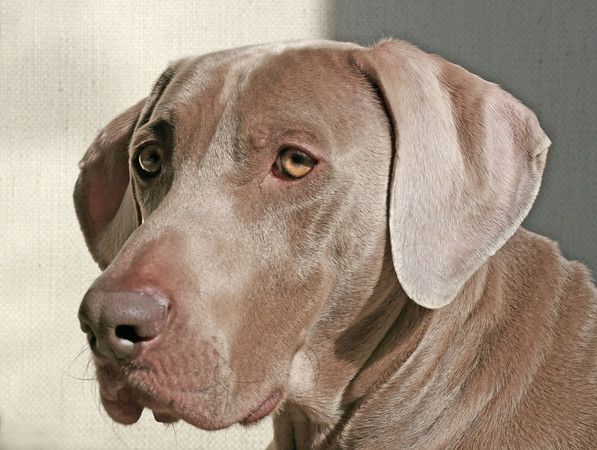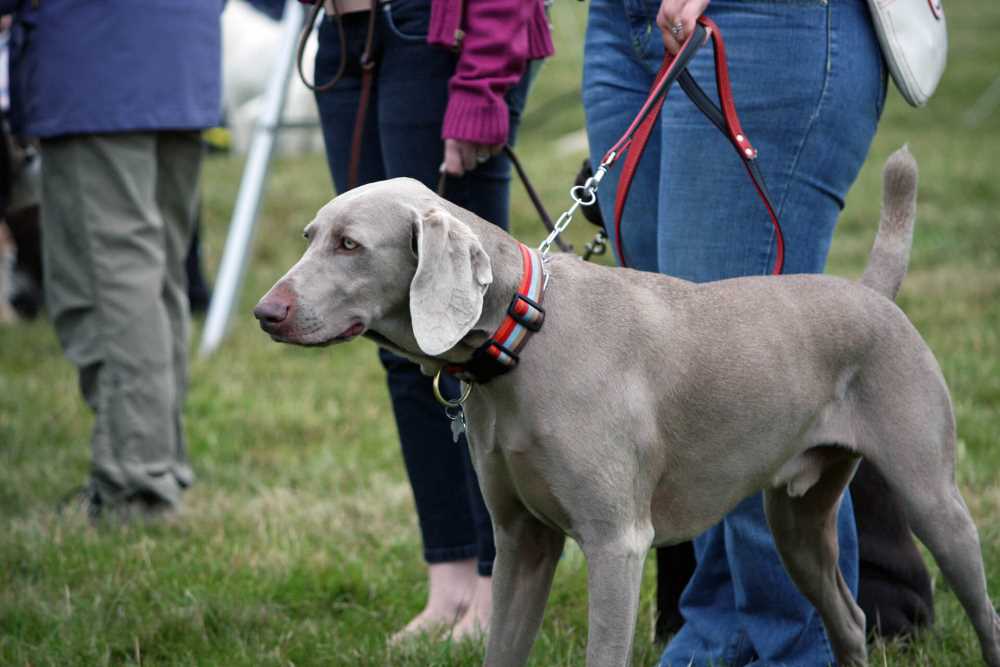Your dog may have old dog dementia or cognitive dysfunction syndrome if your Weimaraner is over 8 years old. But, before you jump to conclusions, make sure you have ruled out sensory losses like deafness or blindness.
It is true that older dogs can develop an Alzheimers-like condition which is a form of dog senility. Similar to human dementia, canine cognitive dysfunction is progressive, meaning that it will get worse, in time.
What are the Symptoms of Dog Dementia?
Just like in people, dogs develop dementia when they have degeneration or a breakdown in the nervous system.

Generally speaking, if your dog is starting to be senile, you will see confusion and disorientation.
Your dog may not even recognize familiar people and places.
With canine dementia, a dog can easily wander away from home and get lost.
If you think your dog may have dementia, look for these signs:
New Behaviors
- Pacing back and forth – with no obvious reason
- Repetitive licking – someplace on your dog’s body. She may even lick a spot until it becomes inflamed and sore, with hair loss.
- Sleeping a lot – especially in the daytime
- Trembling or shaking – without an obvious reason
- Appetite – eating more or less than usual. The same for drinking water.
Confused Behaviors
- Getting night and day mixed up – being awake at night, with restlessness
- Incontinence or soiling in the house – even if your dog still has control
- Staring at the walls or into space
- Getting lost in your house or yard
- Increased vocalizations – barking without reason or for long periods of time
- Not interacting with family members – not seeming to care if there is contact or interaction
- Your dog doesn’t respond to her name
- Ignoring familiar commands
It is important to rule out other conditions. Issues like sight loss, hearing loss, heart disease or the pain and stiffness of arthritis can all have similar symptoms to senility.
If your dog has dog dementia, the symptoms will just continue to worsen over time.
What Causes Canine Dementia?
In addition to degenerative changes in the brain, there are some other physical conditions that can cause dementia in dogs. These include:
- Hypothyroidism
- Epilepsy
- Tumors in the brain, as with Cushing’s disease
- Oxygen deprivation, caused by heart disease or lung disease
- Old dog encephalitis – this is a chronic brain inflammation, seen in dogs that had distemper in earlier years. This can occur, even if your dog had the virus as a puppy and didn’t show symptoms.
If your dog has one of these conditions, treating the disease may help improve his cognitive skills.
How Can You Help a Dog with Dementia?
While ways to help your dog are somewhat limited, there are some things that you can do to make things easier for both you and your dog.
- Don’t move things – keep furniture, your dog’s beds and your dog’s food bowls in a location that is familiar. Moving any of these can be confusing to a dog with dementia.
- Walk with a leash – When you take your dog for a walk, keep her on a leash. This gives you control and prevents her wandering off or running into danger.
- MaxxiSAMe – This is a supplement for older dogs. Seems to slow down the progression of dementia in dogs, but also improves liver function, decreases inflammation in joints and improves your dog’s mood. Available at Amazon.
- Hemp Dog Chews – a nice way to calm an anxious older dog. Hemp dog treats that relieve pain and stiffness, anxiety and depression and inflammation in your dog’s body.
- Thundershirt – Thundershirts can be very calming to a dog who is confused and anxious. Similar to being embraced or hugged, it gives a dog a feeling of security and calm. I’d suggest that a Thundershirt could be your pet’s new everyday clothing.
- Groom your dog often – This gives her needed interaction and affection and does what she probably isn’t doing for herself.
- Provide mental stimulation – Talk to your dog, practice obedience commands and play with your dog daily.
- Prevent accidents in the house – If your dog is incontinent, you might want to look into these tips and products.
While the prognosis for a dog with dementia is not good, you can still enjoy time together with your dog as she slips into old age.






Leave a Reply